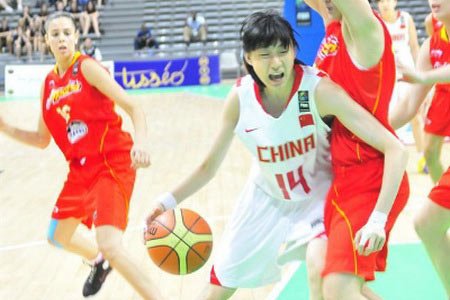Li's defection to Japan rankles the CBA
 0 Comment(s)
0 Comment(s) Print
Print E-mail China Daily, April 17, 2013
E-mail China Daily, April 17, 2013
 |
|
Li's transfer to Japan has stirred a heated debate. |
The country has been urged to invest more in women's basketball development after a former youth national representative recently became a citizen of Japan.
Although Chinese athletes representing foreign countries in badminton and table tennis is widely accepted, such a case in basketball has stirred a heated debate.
The Chinese Basketball Association confirmed on Monday that former national youth team center Li Mingyang, who left her Beijing team to seek treatment for an injury in Japan in 2010, was later discovered in the Japanese league playing for Chanson V-Magic, boasting Japanese citizenship and having adopted the name Miyuki Sugiyama, which she acquired last May.
"Li's transfer to Japan without notifying her Chinese club was a violation of the rules and has severely distorted the sports transfer market," Duan Lian, senior executive with the CBA, said on Monday.
Although FIBA, the game's world governing body, issued fines totaling $48,300 on the Japanese Basketball Association and Chanson, Duan said the CBA would continue discussion with the Japanese side to try and reclaim Li.
The news created great controversy on Tuesday with opinions divided.
Current youth national team coach Li Xin said Li's move was unacceptable, tweeting on her micro blog on Tuesday that, "no matter if she has a Chinese or Japanese name, she will be spurned by everybody who loves Chinese basketball for her unpatriotic behavior".
However, some renowned figures, including popular commentator Xu Jicheng, asked fans to stay calm, stressing a lack of attention on the female game had prompted Li's move as well.
"She is not the first case (to be naturalized to play in Japan)," Xu said. "If we want to keep our own talents at home, the governing body, sponsors and the whole society have to do better jobs in player education, salaries and post-career employment to make the league more appealing than overseas destinations."
According to a poll on the CBA's official website, 8,515 participants agreed with Li Xin that "Li Mingyang shouldn't join the Japanese league" while 6,325 supported the move, saying, "the public should respect the player's decision".
While the CBA has lured a number of lucrative sponsorship deals and attracted increased media interest over the past few years, China's female league, the WCBA, has been struggling since its 2001 inception.
The CBA signed a five-year sponsorship deal, which was reportedly worth $323 million, with domestic sportswear giant Li-Ning last year; the WCBA is still without a major sponsor.
According to a China Youth Daily report, this year's WCBA champion team, Shanxi Flame, received operating funds of $800,000 - only a sixth of a CBA team's annual budget - before the 2012-2013 season.
Boasting better incentives and the chance to acquire Japanese citizenship, the Japanese league has lured three other Chinese players, including former national reserve team member Li Shasha, since 2008.
Those defections didn't draw much attention in China as none of those players played major roles, like Li, in the WCBA or with the national team.
Born in 1994, Li honed her skills with the Beijing team at an early age and represented China at the FIBA Under-17 World Championships, where she averaged 6.4 points and 6.2 rebounds in 2010.






Go to Forum >>0 Comment(s)